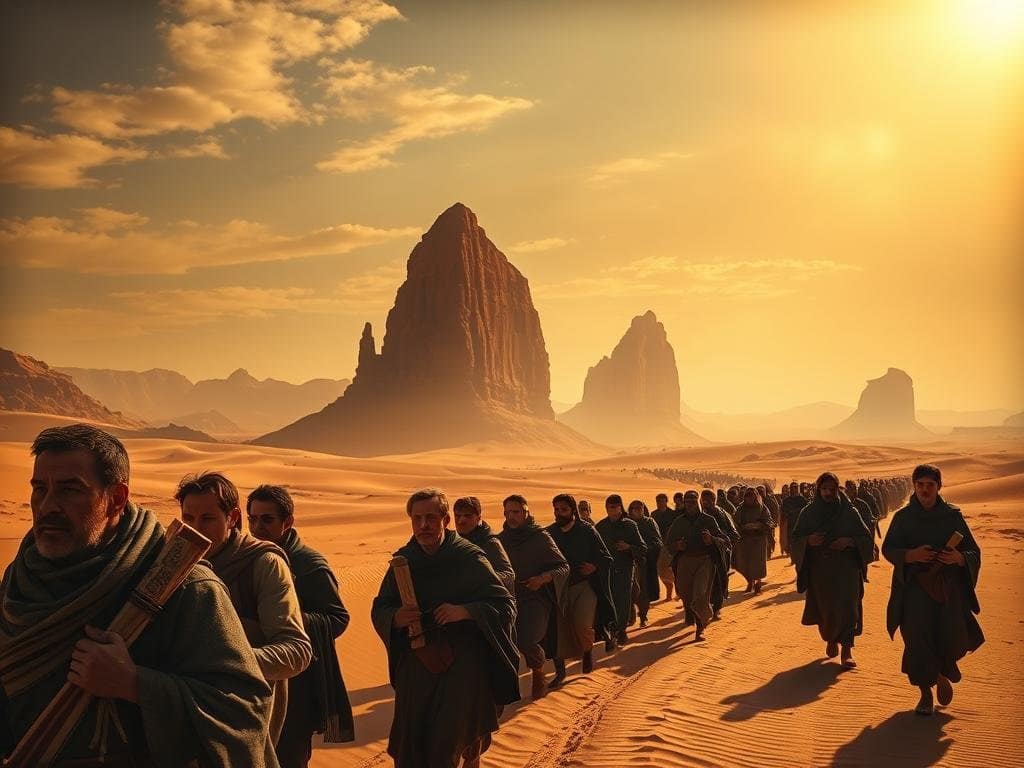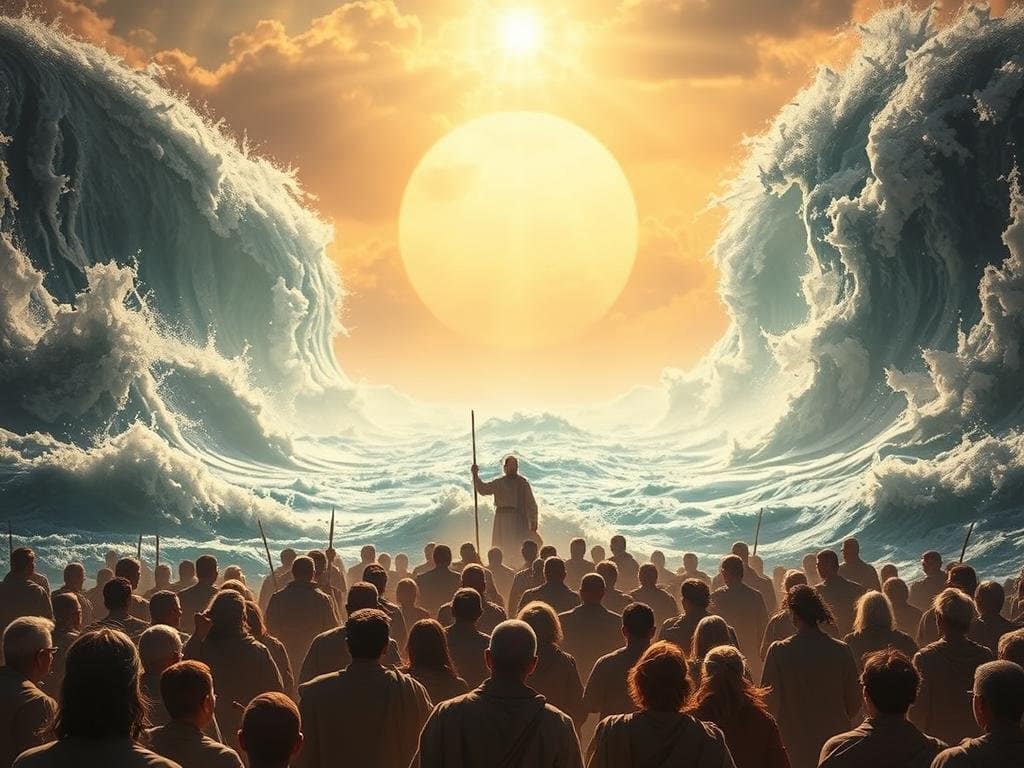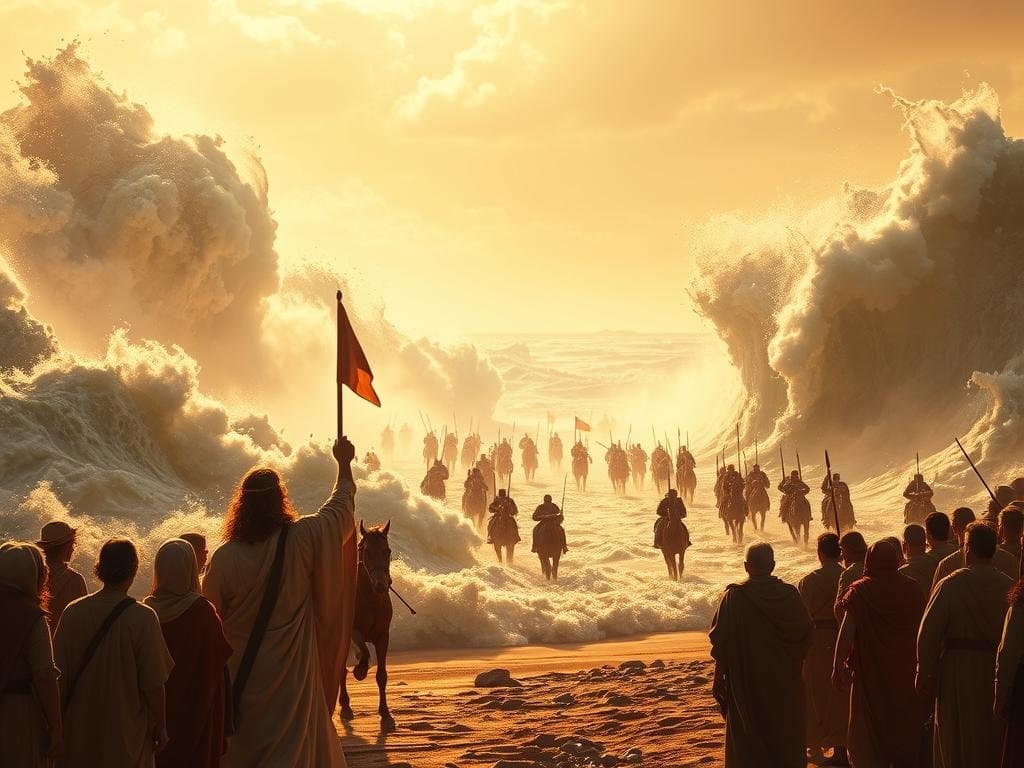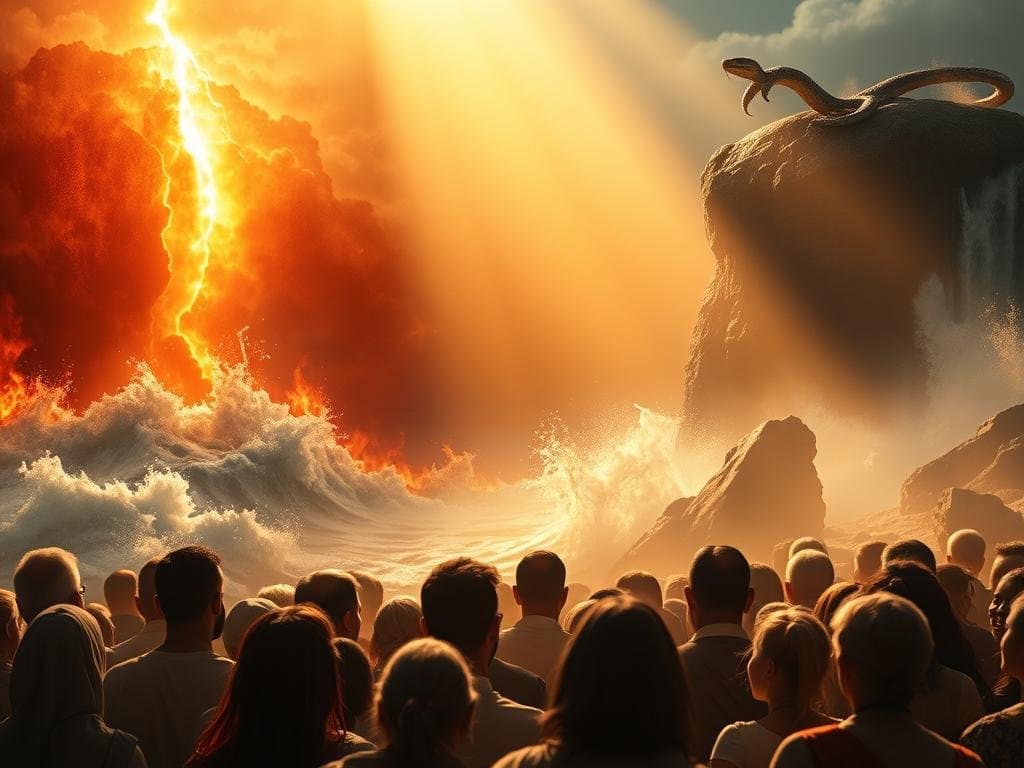Exodus: A Journey of Miracles, Faith, and Spiritual Awakening
Have you ever felt stuck in a season of life where hope seems distant? Imagine standing at the edge of a sea, unsure how to move forward—until a path appears where none existed.
This is the heartbeat of the ancient story we’re about to explore: a timeless narrative of liberation, courage, and discovering purpose even in the wilderness.
The biblical account of Moses leading his people isn’t just a dusty relic of history. It’s a mirror reflecting your own struggles and triumphs.
Through plagues, parted waters, and moments of doubt, this story reveals how divine presence and guidance can transform fear into unshakable trust.
You’ll see how themes like liberation from oppression and the pursuit of a promised future still resonate today. Whether it’s the pillar of fire guiding wanderers or the quiet whisper that nudges your soul toward growth, these events carry layers of meaning.
They challenge us to ask: What chains do we need to break? Where is our “Red Sea moment” waiting?
This article isn’t just about the past. It’s an invitation to see your life as part of a grander journey—one where every trial can become a stepping stone toward spiritual awakening. Let’s walk this path together, uncovering wisdom for modern hearts in an age-old book.
Introduction to the Spiritual Journey of Exodus
What if your biggest obstacle became the doorway to freedom? The ancient story found in the Old Testament’s book of Exodus doesn’t just recount events—it paints a vivid picture of human courage meeting divine power.
Imagine a nation enslaved for generations suddenly stepping into a wilderness journey that reshapes their identity.

When History Meets Hope
Moses’ leadership wasn’t about perfect plans but radical trust. The parting of the Red Sea wasn’t merely spectacle—it symbolized breaking chains that once felt unshakable. Every step toward freedom required both divine intervention and human action.
Your Story in Their Footsteps
This story whispers to your soul: What “Egypt” are you being called to leave behind? Like the Israelites, your journey might involve unexpected turns. Yet the same force that guided them through fire and cloud still shapes life’s chaotic moments today.
The giving of the Law on Sinai? It’s more than rules—it’s a blueprint for thriving beyond bondage. Whether you’re wrestling with doubt or longing for liberation, this journey invites you to trade fear for purpose.
Understanding the Historical Context and Liberation Themes
Imagine waking each day under the weight of chains, both visible and unseen. For generations, the Israelites endured slavery in Egypt—a land that offered security at the cost of dignity. Their story, preserved in the ancient book, reveals how divine intervention reshaped a people’s destiny.

From Egypt’s Bondage to the Promised Land
Egypt symbolized more than physical oppression. It represented a mindset of limitation—a place where identity was stripped away. When Moses led the people into the wilderness, they faced not just harsh terrain but the struggle to unlearn survival instincts forged in captivity.
The Red Sea crossing wasn’t merely one of many events. It marked a rupture between old patterns and new possibilities. For forty years, the wilderness became a classroom where former slaves learned to trust, collaborate, and embrace their role as a nation.
Why did the promised land matter? Canaan wasn’t just fertile soil—it embodied hope after generations of deferred dreams. Yet reaching it required confronting fears deeper than Pharaoh’s armies. True freedom demanded inner transformation as much as external deliverance.
Today, this exodus narrative challenges us: What systems or beliefs keep you captive? Like the Israelites, your journey toward freedom might involve unexpected detours. But each step through life’s wilderness can prepare you for the promised land waiting beyond the horizon.
Exploring the Multi-layered Meanings of Exodus
What if every miracle in this ancient text held secrets meant just for you? The story of liberation isn’t flat—it’s a diamond with countless facets. To uncover them, we turn to the Pardes method, a four-layered approach used for centuries to reveal hidden wisdom.

The Pardes Approach: Peshat, Remez, Derash, and Sod
Start with Peshat—the plain sense. The burning bush? Literally, a fiery plant. But Remez hints deeper: it’s a divine presence that ignites purpose without consuming your essence.
Derash asks: How does crossing the Red Sea mirror your soul’s journey from fear to freedom? Finally, Sod whispers mystical truths—like how Sinai’s laws blueprint cosmic order.
Allegorical Interpretations and Spiritual Insights
That parted sea isn’t just water. It’s life’s impossible barriers dissolving when you move in faith. The bush that burns yet remains? Your soul’s resilience amid trials. As one scholar notes, “The text becomes a mirror—what you see depends on how deeply you look.”
Interpreting Miracles, Laws, and Divine Interventions
Every plague and commandment carries themes for today. Manna in the desert? It’s about trusting daily grace. The Ten Commandments? Not rules, but guardrails for thriving. When you view these events through Pardes’ layers, you’ll find ways to turn your own wilderness into sacred ground.
Your experience of this story isn’t static. Like the Israelites, you’re invited to worship through wonder—peeling back layers until liberation becomes personal. What truth will you uncover in the fire or the waves?
Literary Adaptations and Spiritual Models in Exodus
Great stories shape how we see the world—and few have inspired more adaptations than the exodus story. Unlike the solitary hero’s quest found in myths, this ancient journey centers on community, showing how liberation unfolds through shared struggle and divine partnership.
Collective Liberation vs. Solo Quests
Joseph Campbell’s Hero’s Journey follows one person’s trials, like Odysseus battling alone. But the exodus story flips the script. Dante’s Divine Comedy mirrors this communal arc—his trek through hell and paradise reflects Israel’s group transformation.
Even Bunyan’s Pilgrim’s Progress, though focused on Christian’s personal path, borrows Exodus themes of deliverance for all.
Faith Traditions Reimagining Freedom
Jewish thought sees the Exodus as history lived: Passover meals make every family relive liberation. Early Christians like Gregory of Nyssa viewed it as a metaphor for the soul’s ascent to God.
Today, both traditions agree—true freedom requires strength forged in community, not just individual grit.
What does this mean for you? Whether you’re reading the Old Testament or modern novels, the journey matters. It’s not about lone heroes—it’s about finding your part in a bigger story of hope.
Exodus: A Journey of Miracles, Faith, and Spiritual Awakening
What if your daily routines could become sacred steps toward freedom? The ancient exodus wasn’t just about a nation—it’s a blueprint for your personal journey. Every choice to trust, every small act of courage, writes a new chapter in your story of liberation.
When Scripture Meets Your Kitchen Table
Think of the Israelites gathering manna—a daily miracle requiring trust. Your faith grows the same way: through ordinary moments where you choose hope over fear.
As one study group leader shared, “Our church potlucks feel like modern-day manna—reminders that God provides through community.”
Breaking Invisible Chains
Pharaoh’s armies weren’t the only threat. The real battle? Unlearning slave mentalities. Your journey might mean shedding self-doubt or old habits. Like the people crossing the sea, freedom starts when you take that first step into unknown waters.
Sacred time anchors this process. Lighting Friday candles or pausing for morning prayer aren’t rituals—they’re rebellion against life’s chaos. Each tradition whispers: “You’re part of a bigger story.”
“Liberation isn’t a one-time event—it’s the daily work of choosing trust.”
Your wilderness seasons? They’re where strength gets forged. When doubts arise, lean into your community—like the Israelites relying on each other’s skills to build the Tabernacle. Together, you’ll find the way forward.
Insights from Biblical Scholarship and Community Reflections
Where do you see yourself in the story of collective hope? Biblical scholars reveal how the book of Exodus isn’t just ancient history—it’s a living guide for building community today.
Like the Israelites learning to trust in the wilderness, your local church becomes a place where faith grows through shared struggle and celebration.
Your Role in a Faithful Church Community
Modern Bible studies unpack how the Old Testament’s themes—like water symbolizing renewal—mirror our lives.
One member shared, “Our small group discussions feel like crossing the Red Sea together—each week brings new freedom from old fears.” These moments remind us: people thrive when rooted in purpose bigger than themselves.
Collective worship isn’t about perfect harmony. It’s about showing up, messy and real, just as the Israelites did.
When you sing hymns or serve meals, you’re continuing their story of imperfect faith. The beginning of your spiritual journey might feel shaky, but every step draws you closer to heaven’s vision for belonging.
“True liberation happens when we carry each other’s burdens—just like Moses and Aaron shared leadership.”
See water in your life? Maybe it’s tears during prayer or baptismal vows. These struggles shape your soul, teaching resilience. Dive into a community that walks with you. After all, the Promised Land wasn’t reached alone—it took a people united by hope.
Conclusion
Liberation isn’t just a historical event—it’s a choice we make daily. Throughout this exploration, you’ve seen how ancient struggles mirror modern battles for freedom. From breaking chains of slavery to stepping into uncharted lands, the journey remains timeless.
Each section revealed layers—how themes like trust and community shape both a nation’s story and your personal path. The parted sea wasn’t just water; it’s life’s barriers dissolving when you move with faith. The Law given at Sinai? Not restrictions, but guardrails for thriving.
This ancient book isn’t confined to the past. Its stories breathe into your daily battles, urging you to see deserts as classrooms and trials as stepping stones. Your “Promised Land” might look different—a healed relationship, a reclaimed dream—but the way forward starts with courage.
Carry these lessons like manna: nourishing, daily, shared. Whether through prayer, service, or quiet reflection, every choice writes your exodus. The destination? Closer than you think—heaven’s hope whispering, “Keep going.”
FAQ
Q: How does the Exodus story connect to modern spiritual struggles?
A: The wilderness journey mirrors your own challenges in seeking purpose. Just as the Israelites faced doubt, you might wrestle with uncertainty. Their reliance on divine guidance offers a model for trusting a higher plan during personal trials.
Q: What lessons can you learn from the Red Sea crossing?
A: This miracle symbolizes breaking free from what holds you back. Like the parted waters, unexpected paths often appear when you courageously step forward. It’s a reminder that liberation requires both faith and action.
Q: Why does the burning bush matter in daily life?
A: The bush represents sacred moments in ordinary places. Pay attention to “holy ground” in your routine—those times when clarity breaks through. It’s an invitation to listen deeply, even amid life’s busyness.
Q: How do Christian and Jewish views differ on Exodus’ liberation themes?
A: Jewish teachings often emphasize collective freedom and covenantal law, while Christian interpretations may focus on Christ as the ultimate liberator. Both perspectives highlight breaking chains—whether societal, spiritual, or internal—to live authentically.
Q: Can the hero’s journey framework apply to Exodus?
A: Unlike solo hero tales, Exodus centers communal transformation. Your growth isn’t isolated—it’s tied to others. The story challenges you to see freedom as a shared mission, not just individual triumph.
Q: What’s the significance of the Promised Land metaphor today?
A: It’s not just a physical place but a state of heart—living with purpose and connection. Your “promised land” might be overcoming fear, nurturing relationships, or finding inner peace amid chaos.
Q: How does the Pardes method deepen understanding of these stories?
A: The four levels—literal, symbolic, ethical, and mystical—invite you to explore layers of meaning. For example, manna isn’t just ancient bread; it could represent gratitude for daily blessings or spiritual nourishment you overlook.
Q: Why emphasize community in Exodus-based faith practices?
A: The Israelites’ journey shows that belonging sustains hope. Your faith grows stronger when shared—whether through worship, service, or simply walking alongside others during their wilderness seasons.







